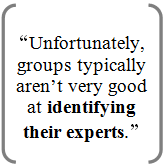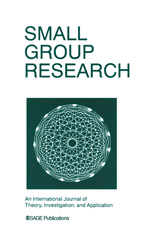Is Your Team Using Its Biggest Resource?
Editor’s note: We are pleased to welcome Michael R. Baumann of The University of Texas at San Antonio and Bryan L. Bonner of the University of Utah. Their paper, “Member Awareness of Expertise, Information Sharing, Information Weighting, and Group Decision Making,” is forthcoming in Small Group Research and now available in the journal’s OnlineFirst section.
 One of the biggest resources a group has is the expertise of its members. How this expertise is (or is not) used has a major impact on performance. Groups in which all members know which member is an expert at what discuss information more thoroughly, weight information more appropriately, and generally perform better than groups in which members are unaware of each other’s expertise.
One of the biggest resources a group has is the expertise of its members. How this expertise is (or is not) used has a major impact on performance. Groups in which all members know which member is an expert at what discuss information more thoroughly, weight information more appropriately, and generally perform better than groups in which members are unaware of each other’s expertise.
Unfortunately, groups typically aren’t very good at identifying their experts. This is a potential obstacle for new groups, groups with changing membership, and groups addressing problems requiring knowledge that was not previously relevant. Although it is unlikely in such groups that all members know who the expert is, it is possible that some subset of members knows.
 This possibility led us to wonder about the nature of the relationship between the number of members aware of expertise and the benefits associated with recognition of expertise. Our reading of the literature suggested a sudden shift in discussion and weighting might occur once a majority of members knew who the expert was.
This possibility led us to wonder about the nature of the relationship between the number of members aware of expertise and the benefits associated with recognition of expertise. Our reading of the literature suggested a sudden shift in discussion and weighting might occur once a majority of members knew who the expert was.
To examine this possibility, we assembled groups and had them perform a decision making task involving a fictional company. This allowed us to control what decision-relevant information each member knew prior to the start of discussion. In each group, we used this control to create an expert (i.e., one member with more information) and to manipulate the number of members aware of the expert’s identity prior to discussion. As expected, groups in which half or fewer members entered discussion knowing who the expert was differed from those in which a majority knew. The latter discussed unique information much more thoroughly than the former.
The mapping of member awareness of expertise to improved weighting suggested a more complex function. Rather than one shift point, the overall pattern suggested the improvement occurs in two steps. The first shift occurred when even one member entered discussion aware of expertise, and the second when a majority entered discussion that way. Interestingly, neither pattern was found for members’ ratings of expertise (i.e., explicit recognition).
These findings suggest not all members need to be aware who the expert is for the group to obtain the full benefits of recognition of expertise. They also raise the possibility that the processes leading to improved information sharing and weighting may differ from each other, and that explicit recognition may not be necessary for either.
Read the paper, “Member Awareness of Expertise, Information Sharing, Information Weighting, and Group Decision Making,” online in Small Group Research.
Michael R. Baumann earned his PhD from the University of Illinois, Urbana-Champaign in 2001. He is currently an associate professor at the University of Texas, San Antonio, USA, where he specializes in social and organizational psychology.
Bryan L. Bonner earned his PhD in Social Psychology from the University of Illinois at Urbana-Champaign in 2000. He is currently an associate professor of organizational behavior at the University of Utah, USA.
































































































Excellent. Very useful in team training and building, especially when using simulation/gaming.